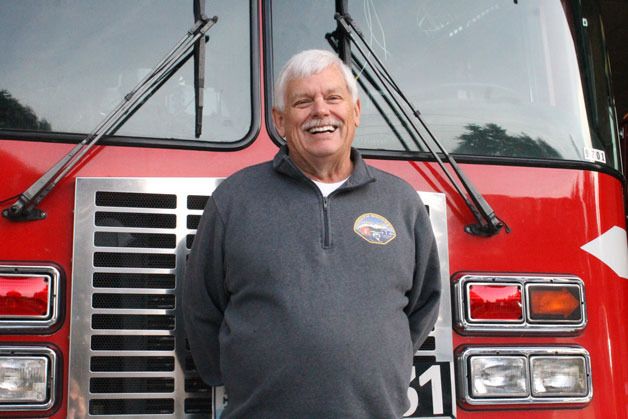One of South Whidbey’s greatest and longest serving protectors will hang up his fire hat this month.
Paul Busch, a South Whidbey Fire/EMS firefighter for 35 years, is retiring. His last official day on the job is Dec. 31.
The man joined the department in 1978, and over three and a half decades he’s fought fires, responded to car accidents, natural disasters, been witness to tragedy and miracles and likely saved a few cats in trees. He’s also seen and trained hundreds of volunteer firefighters over the years and, like most in his line of work, is quick to write off his own accomplishments and give credit to others.
“I’ve seen (volunteers) come and I’ve seen them go,” Busch said. “They’re the ones the community really needs to thank.”
Busch, 69, has served as a volunteer firefighter, training officer, and assistant fire chief for the department. He’s overseen training of volunteers, vehicle maintenance, and the marine division program. Jason Laughren from Palm Coast Fire Department in Florida was hired last month to take his place.
Laughren will start his new position on Jan. 1.
Busch said he was grateful for all the volunteers, commissioners, and fire chiefs that he’s worked with in the past. He was especially thankful for current commissioners Kenon Simmons, Mike Helland, and Robert Elliot, as well as Chief Rusty Palmer. He was also thankful for the neighboring fire departments on the island and the relationships he’s built with them.
“It’s kind of bittersweet,” Busch said. “After 35 years, the biggest enjoyment is always helping people out and seeing a good outcome. Sometimes all the outcomes aren’t exactly the way you’d like to see them, but there’s always the good and the bad.”
“The thing I don’t think I’ll miss is the pager going off at 2 a.m.,” he added.
To say a lot has changed since Busch first volunteered at the Freeland fire station in 1978 is an understatement. Back then, the department had no fire tenders. Instead, they used old and worn oil tankers. Three new fire stations were built during his tenure and also the removal of the Bush Point station.
He’s also seen the rate in which the department responds to calls increase tremendously.
“I can remember when I first started that we averaged anywhere between 200 to 350 calls a year, which was a lot back then,” Busch said. “But now, this year, we’ll probably break 2,300 calls for the year.”
Busch was hired onto the department as a training officer in September 1980. A few years later, the marine division program got its start, albeit under somewhat dark circumstances.
The editor of the Seattle Post-Intelligencer in the mid-1980s drowned while either setting or pulling crab pots, said Busch, and attempts to resuscitate him were unsuccessful. Donations were given to the department shortly after, which provided funds for a marine boat. Grants led to a bigger boat. The division eventually expanded to its current form with a 32-foot aluminum, dual 450 horsepower engine fireboat, as well as a technical/high-angle rescue team.
“We’ve really evolved from something small to something big,” Busch said.
He climbed the proverbial fire ladder in the department until he reached his current position of assistant chief in the early 1990s.
Palmer said Busch has been his “go-to guy” because of his institutional knowledge, having served the department for almost half of its existence. The department was established in 1952. He also complimented Busch on his generous personality.
“He’s such a nice man. People seek him out to talk to him,” Palmer said. “For younger members, he’s somewhat grandpa like. He’s such a kindhearted person. He’s willing to help anybody.”
One of the more peculiar but ultimately funny memories Busch has of his time with the department happened over a decade ago. Busch said they received a call from a woman who said she woke up to a sudden blindness. Because the department received multiple calls that evening, Busch responded to it personally. When he arrived on scene, he used his flashlight to enter the home. But when the woman noticed that she could see the flashlight, the pair had a laugh.
The power had gone out but she hadn’t realized it.
“That one really sticks out,” Busch said.
Busch said some of the more difficult calls he had responded to involved children, especially if there was a fatality. Busch credited his time in the Marine Corps as a means of coping with some of the more difficult parts of his job.
Busch plans to stay involved with the department after his retirement, as he hopes to test volunteers on state exams after they’ve completed their training academies.
“It’s just to stay involved and it’s a lot of fun and you still get to work with the volunteers a little bit,” Busch said.
When he’s not helping the department, Busch will spend his free time either fishing or traveling.
“It’s been a great pleasure,” Busch said. “I would have liked to retire maybe a little bit sooner but it’s been a lot of fun. The enjoyment you get out of helping the community really supersedes anything else. The fact that you can help the community out that you live in is a huge positive.”



